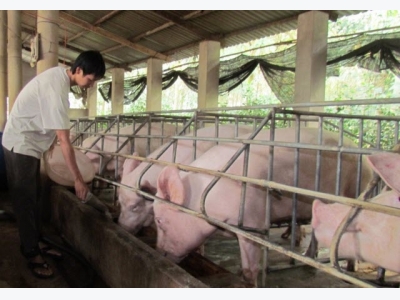The untapped potential of pork exports

Vietnam hardly exports pork despite the significant potential for such products. To ensure sustainable development of the livestock sector, production must adhere to the chain model and disease-free areas must be built.
Difficulties in exports
The Ministry of Agriculture and Rural Development in Hanoi held the first ever Vietnam Pork Export Promotion Forum 2017 on October 20. Gabor Fluit, general director of De Heus Asia, told participants that Vietnam has many opportunities to export pork to China, Japan and the Republic of Korea because the three countries are geographically close and the demand there is at the highest level in the world. Data indicates that China imports 2.2 million tonnes of pork per year, while Japan and the Republic of Korea import 1.3 million tonnes and nearly one million tonnes, respectively.
However Vietnamese pork exports have not met their potential. Deputy Minister of Agriculture and Rural Development Tran Thanh Nam said that Vietnamese pork exports have not yet created a breakthrough and are mainly exported to China on a small scale. According to Ipos Business Consulting (IBC), Vietnam exported nearly 12 million pigs to China through border routes in 2016. Vietnam also exported about 15,000-20,000 tonnes of frozen pork via official channels to Hong Kong-China and Malaysia during the 2013-2016 period.
Revolution needed
Gabor Fluit said that in addition to competitive prices, Vietnam must meet strict requirements in pork exports, such as disease-free breeding areas and closed production processes. Therefore, to facilitate exports, the Vietnamese livestock sector needs comprehensive change, he said.
For now, businesses should focus on the production and export of processed products. They must have a synchronous investment in cold storage systems and modern production lines following international standards. In addition, Vietnam should promote international relations, sign bilateral agreements and build disease-free areas.
In addition to livestock models following GlobalGAP standards, Vietnamese businesses should promote the development of the value chain.
Deputy Minister of Agriculture and Rural Development Vu Van Tam said the livestock sector needs to promote restructuring, as well as adopt appropriate and effective export orientations and strategies.
Minister of Agriculture and Rural Development Nguyen Xuan Cuong: The ministry will review the program on disease-free areas and direct veterinary units to promote negotiations with potential export markets. In addition, businesses must promote links with farmers, the state and scientists, while farmer households and cooperatives need to find ways to reduce production costs.
Related news
 Belgium can export pears to Vietnam
Belgium can export pears to Vietnam As of next week the Belgian Conference pears will gain access to the Vietnamese market.
 New bovine tuberculosis test to detect bacteria in just six hours
New bovine tuberculosis test to detect bacteria in just six hours Actiphage TB – a new test for bovine tuberculosis (bTB) – will soon be available from start-up PBD Biotech based in Suffolk, UK.
 South Korea to export fresh fruit to Myanmar
South Korea to export fresh fruit to Myanmar South Korea will ship about 37 tons of fresh fruit to Myanmar to assess its potential and build effective distribution channels in the local market